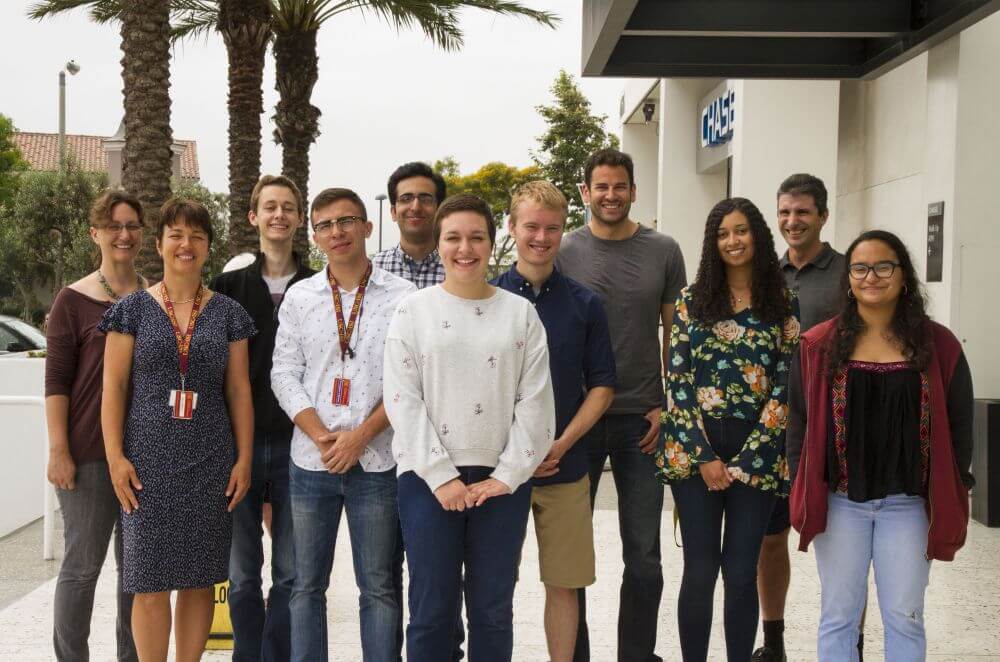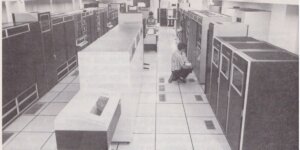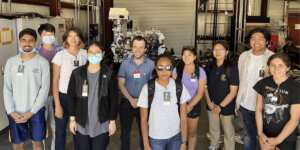
ISI’s inaugural REU program participants, hailing from across the US, pictured with their supervisors and ISI REU site leader Jelena Mirkovic (front row, left). Photo/Caitlin Dawson.
This summer, a group of seven undergraduate students from across the U.S. tried their hands at research at ISI as part of the National Science Foundation’s Research Experience for Undergraduates (REU) Program.
During the eight-week program, participants worked with other students and ISI researchers to complete research projects on the theme of “human communication in a connected world.” While some had a passion for cybersecurity, others focused on data analysis, natural language processing and internet protocols.
“Working on real-world research projects gives undergraduate students a feel for the day-to-day experience of being a researcher and a leg-up in graduate school,” said REU site leader Jelena Mirkovic, an ISI research team lead.
“Through this program, students from a range of academic and geographic backgrounds have the opportunity make lasting connections with faculty and other students, helping them develop networks that could influence their future educational pursuits and careers in technology.”
Following a poster presentation at ISI’s headquarters in Marina del Rey on July 16, the program wrapped on July 20 with students from ISI’s program joining seven REU teams from across the region to present their findings at USC’s Institute for Creative Technologies.
This year, participants in ISI’s inaugural program were pursuing degrees at Illinois Institute of Technology, University of Puerto Rico, Wartburg College, Macalester College, Oberlin College and UCLA.
“It has been a great experience,” said Wartburg College junior Allison Limke of Illinois, who used natural language processing techniques to create a movie script generator.
“Eight weeks ago, I didn’t know anything about neural networks or language generation; everything was brand new. The program has opened a new window into what research actually entails and made me feel more confident in my own abilities.”
Psychology majors Jessica Oritz and Natalie Hermann analyzed data to identify specific traits or worldviews that make people successful at predicting future geopolitical and economic events, a skill known as “super-forecasting.” Hermann, who is minoring in computer science at the Illinois Institute of Technology, said the project gave her new insights into data analysis.
“In this project, we were working with aggregated data,” she said. “I would never have considered breaking down this data into different groups, but when we did, we found evidence of Simpson’s Paradox, where a statistical relationship is true for a population but not its subgroups. That was a really fascinating and unexpected discovery.”
Junior Kai Walberg from Mount Vernon, Iowa, worked on a project aimed at discovering new vulnerabilities in software.
“I had a little bit of knowledge in cyber security, but not a lot,” said Walberg. “I learned many techniques used in the field, including a program analysis tool called angr. Through the REU, I also learned what it is like to work on research in a real research environment, which is definitely good preparation for grad school.”
Walberg’s supervisor and co-site leader Christophe Hauser, an ISI computer scientist, agrees, adding, “Beyond the technical aspect, students also learn how to communicate about their results, and how to approach problem solving in a methodical way.”
When asked for their advice to any other students considering the REU program at ISI, the responses were unanimous: Go for it.
“There’s a chance you will try something new and love it and you’ll want to follow it through to grad school or in a future job,” said Haven King-Nobles, a senior at Oberlin College in Ohio, who worked on a record linkage project using college football player data.
“Any research experience you can get as an undergraduate is really beneficial and could change the course of your education or career.”
Published on July 30th, 2018
Last updated on May 20th, 2021













